| |
- 1855 - 1859
- Chicago Daily Democrat Articles
- Chicago Daily Tribune Articles
- 1856 Plea to Move Cemetery
- 1857 Plans For Another Cemetery
- 1858 Petition to Beautify the Cemetery
- 1858 Plea to Embelish Cemetery
- 1859 Proposal & Ordinance to Stop Burials
- Rosehill Cemetery
- 1859 Plea to Improve Cemetery
From 1855 through 1859, the city's population was growing and the number of burials, as well as the number of family lots sold in the City Cemetery, reflected this. In 1858, Ira Couch, an early Chicago millionaire, was entombed in the Couch family vault which still stands today in Lincoln Park.
The City Cemetery's conditions seem to have been less than acceptable, as evidenced by the Common Council documents revealed in the tabs, above. The 1858 petition to beautify the cemetery is notable for the signature of 129 prominent Chicagoans.
The first suggestion to convert the city's lakeside cemetery property into a park was published in 1855 in the Chicago Daily Democrat. At the suggestion of a newspaper editorial, a petition circulated and was then presented to the Common Council. No changes took place as a result.
The Chicago Daily Tribune articles amplify the concern for improving the conditions. These newspaper articles also call for an effort to move the cemetery grounds.
In 1857 there were offers by citizens to barter or otherwise exchange lands to move the cemetery from its overcrowded location, now within the city limits.
In 1855, 127 cemetery lots were sold. (At this time, each family lot measured 9'x12' and could hold four sets of remains.)
In 1856, 250 lots.
In 1857, 158 lots.
In 1858, 102 lots.
In 1859, 28 lots.
By November 1859, the city-owned cemetery grounds occupied 120 acres.
A total of 2400 lots had been sold since the cemetery opened in 1843.
There were 1740 unsold lots.
Fifty acres of the land had never been surveyed for cemetery use. (See the Mapping the Cemeteries section.)
In May 1859, the last lots were sold in the City Cemetery.
In August, 1859, Rosehill Cemetery opened.
None of these figures include the numbers buried in the cemetery's potter's field.
There were approximately 2000 deaths per year in Chicago during this period (see the Numbers section.)
1855: 1983
1856: 1893
1857: 2167
1858: 2019
1859: 1826
The dead continued to be buried in the City Cemetery until 1866.
According to Dr. John H. Rauch, from January 1860 to March 1866, 11,341 individuals were buried in the City Cemetery.
This figure includes the 4,000 Civil War rebels who died at Camp Douglas on Chicago's south side and were interred in the City Cemetery's potter's field from 1862 - 1865.
Chicago Daily Democrat Press
June 22, 1855
The Cemetery Park on the North Side
Among reflecting men who understand the subject it can scarcely be doubted that the site for the Cemetery is badly chosen. Not that the ground is badly located but it is but several miles too near the city. In fact it is within the city, and the residences of our citizens are already built far beyond it. The impropriety, we might say absurdity, of having the principal cemetery only a mile or a little more from the centre of a large city, must be apparent to any one who lays claim to any ordinary degree of intelligence.
It is perhaps too late to remove all those who have been interred in the cemetery, but it seems to us that no more lots should be sold north of those already used for interment. The title to the lands already purchased by individuals could not be affected, but it would be very easy to sell no more.
The question arises what shall be done with the lands still in the hands of the city? We will state our plan, and if any one can propose a better it shall have our cordial support.
We learn that there are about fifty acres in one of the quarter sections in the enclosure which is not yet occupied. Let this be set apart for a park; throw the refuse street dirt on it for a year or two, which would enrich the soil, play it out with trees and lay out walks through it in every direction, and in ten years it will be the pride of the city. Being on the lake shore it would be a source of health and pleasure to our citizens whose real value could scarcely be estimated in money.
North of this the city has nearly sixty acres on the lake shore. Lay this off in blocks of from one to two acres and we should not be surprised if it would bring one hundred and twenty thousand dollars. This would furnish the city with ample means to purchase a mile square or more if necessary at Blue Island or Oak Ridge, eight miles West of the city. Perhaps some better location can be found, and if so, let it be chosen; but in our humble judgement something should be done at once in a matter so important to the best interests of the city. Will our city fathers examine this subject.
|
Chicago Daily Democrat Press
June 26, 1855
The Cemetery Park on the North Side
I read with much pleasure the remarks under the above heading in your paper of the 22d just. The ground indicated, lying as it does upon the Lake Shore, is admirably adapted to the purpose of a public park, and the progress of the city in that direction demonstrates very closely that should it be occupied for cemetery purposes, the ashes of the dead, however much to be lamented, will sooner or later be disturbed.
All now admit that a great mistake was made in selecting a site for a cemetery so near the centre of the city. But this error may in part be turned to good account if the unoccupied portion of these grounds cannot of course be interfered with, but the northern portion embracing some fifty acres is still under the control of the city authorities. Every one it seems to me who has the future welfare of the city at heart will say with you let the further sale of this ground for cemetery purposes be stopped and the necessary steps be taken for appropriating it for a Public Park.
A better geographical position for a Park on the lake shore in the North Division could not be chosen. Long ere our city reaches its maximum size it would be centrally situated in the Division. The man who secures such a breathing place on the shore of our noble lake will merit and receive the blessings of posterity. A.B.
****************
The above communication is from one of our most intelligent citizens and far-seeing businessmen. We are glad that our views are seconded from such a quarter. We should be glad to hear from other citizens on this subject, and what would be still better, to see the subject brought prominently before the Council. Who will take time to get up petitions? Who to circulate them? We cannot see any valid objection to the proposition. Let us have one respectable park on the lake shore.
*****************
|
Chicago Daily Democrat Press
July 9, 1855
That Park
Several weeks since we proposed that the city should appropriate the north end of the cemetery grounds, not yet occupied for cemetery purposes – in all some fifty acres – for a public park. Also that new cemetery grounds should be purchased a few miles from the city where the repose of the dead would not be endangered by its onward progress. So far as we know the proposition has been universally approved. Indeed we see not how any valid objection can be urged against it.
In order, however, to effect so desirable an object, and one so important to the future welfare of the city, some few gentlemen should take the time to get up petitions and present them to the Council. Who will take this matter in hand? Who will have the credit of securing the only beautiful and at present available spot in the city for a decent sized public park, where the hundreds of thousands who are soon to inhabit the city can retire for social and healthful enjoyment? The man who will accomplish this will deserve to be held in enduring and grateful remembrance.
________________________________
Chicago Daily Democrat Press
August 21, 1855
Council Proceedings
Monday, Aug 20 8 o’clock pm
Petition of a large number of citizens for stopping interments in the Chicago Cemetery, as soon as some grounds more suitable for the purpose and more remote from residences, can be secured.
________________________________
Chicago Daily Democrat Press
November 12, 1855
Cemetery Lots For Sale. – Persons wishing to purchase some of those very desirable lots in the Chicago Cemetery can now be accommodated by applying to Geo. W. Hunt, City Sexton. |
The newspaper article below, speaks of the high mortality rate of children in relation to the filth in the city.
Unlike the Chicago Daily Democrat, the Chicago Daily Tribune did not publish any 1855 discussions of the desire to move the cemetery outside the city, nor did this newspaper write about the idea of establishing a park on the city-owned grounds abutting the north edge of the cemetery.
The articles here, from 1857, refer to the simultaneous need for more surveyed land within the cemetery to sell for city revenue and to bury the growing numbers of the dead; and a vehement response to instead find other, more suitable burial grounds.
These discussions continued until the Rosehill Cemetery Company was established in early 1859.
During the early negotiations between the city and the new cemetery company, it was agreed that Rosehill Cemetery would provide the city an area of its grounds for for the burial of the poor. |
Chicago Daily Tribune, February 18, 1857

|
Chicago Daily Tribune, August 13, 1857
 |
Chicago Daily Tribune, September 1, 1857

Chicago Daily Tribune, September 18, 1857

|
Chicago Daily Tribune, November 9, 1858
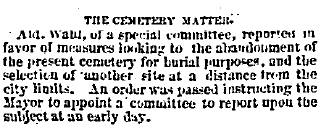
**************
On February 16, 1859, under the heading, "Report on the Cemetery Matter" the Tribune published a transcription of the proposal and ordinance to stop burials in the cemetery. (The original document can be viewed by clicking on its tab, above.)
**************
Chicago Daily Tribune, October 17, 1859
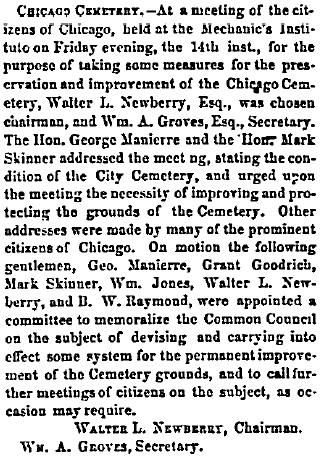 |
Chicago Daily Tribune, August 7, 1856
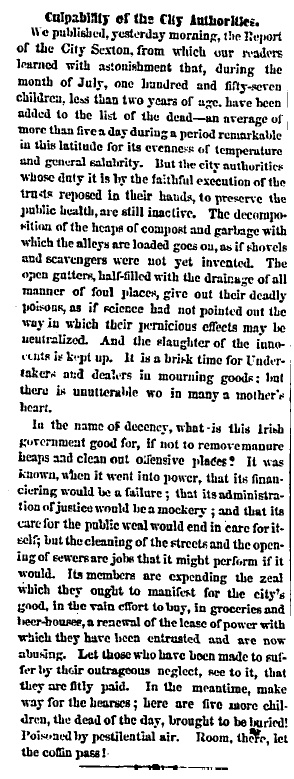
|
(This document, transcribed vebatim, is co-written by Charles Dyer, who in the next Tab above, offers some land he owns for use as an alternative to the current cemetery location.)
To His Honor, the Mayor, and the Honorable the City Council of the City of Chicago –
The undersigned respectfully represent That the growth of population & improvement, in the vicinity of the Public Cemetery, has called public attention to the great value of its territory, which, for beauty & healthfulness of location, is not surpassed in the City or its Suburbs.
Held by the public authorities for the best good of the public, set apart for the purposes of a public cemetery at a period when the rapid extension of population in that neighborhood was not foreseen, & when the great enhancement of its value & uses to the living was not anticipated, & when the sanitary dangers to the City of such extensive intramural interments were not fully understood & felt, the desire is now extensively entertained by our citizens –
1. First – that a stop be at once put to the further occupation of the Cemetery grounds for interments North of the limits to which it has already been laid out & sold.
2. Secondly – that suitable provision for interments be made elsewhere (one in each division for example) without the City limits, adapted to the future wants of the Public, and for the best accommodation of the Inhabitants of the different Divisions.
3. Thirdly – that the public grounds in the present Cemetery, thus to be reserved from future interments, be laid open, in part, or in whole, as a Public Park, & fenced off from the Cemetery proper, for the use of the Citizens of Chicago, said Park being a necessity, soon to be felt in ??? ??? of the city, and not otherwise to be obtained but at a heavy cost.
The undersigned, entertaining these views, respectfully ask for them the consideration of your Honorable Body, and the passage of such Ordinances as shall best accomplish the ends proposed.
Chicago, Dec. 12. 1856.
William Barry
Chas. V. Dyer
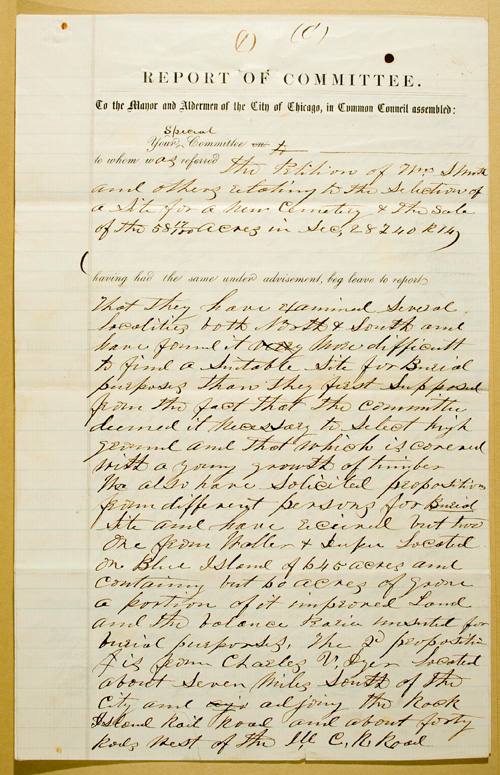
All documents on this page, courtesy of the Illinois Regional Archives Depository.
|
REPORT OF COMMITTEE.
To the Mayor and Aldermen of the City of Chicago, in Common Council assembled:
Your special Committee to whom was referred the Petition of Wm Smith and others relating to the selection of a Site for a New Cemetery & the sale of the 58 17/100 acres in Sec, 28T40R14
having had the same under advisement beg leave to report
That they have examined Several localities both North & South and have found it very more difficult to find a Suitable Site for Burial purposes than they first Supposed from the fact that the committee deemed it necessary to select high ground and that which is covered with a young growth of timber.
We also have Solicited propositions from different persons for Burial Site and have received by two. One from Waller & Dupee Located on Blue Island of 645 acres and containing but 60 acres of grove a portion of it improved Land and the balance unsuited for burial purposes. The 2d proposition is from Charles V. Dyer Located about Seven Miles South of the City and adjoining the Rock Island Rail Road and about forty Rods West of the Ill C.R. Road
Scroll to the Right ----->> |
|
The ground is high and totally well timbered, and your committee having visited Several Tracts with a view of Selecting a Cemetery Site are of the opinion that this tract is well adopted for Said Cemetery Site and would therefore Submit the two propositions and recommend the acceptance of Charles V. Dyer’s Proposition for the exchange therein Specified and would ask for the passage of the follow Order
Ordered
That when Charles V. Dyer Shall Submit to the Mayor & Clerk a Good Warranty Deed with a perfect transcript of the title of the W1/2 of Sec.33 T38. R14 lying west and adjoining the Chicago & R. R.Road being 280 acres. Also W1/2 of NE 1/4 of Same Sec, being 80 acres. Also N.E.1/4 of Sec 4, T37, R14. Also all of the N.W. of Sec 42, 37, R 14, Lying East of R.R. the last two tracts containg 208 acres also W1/2 S.E. 1/4 33 aforesaid E1/2 of N1/4 of Sec 4, T37, R14. The last containing 160 acres, Making in all 640 acres.
Then the Mayor & Clerk hereby directed to make out to Charles V. Dyer a good and Sufficient warranty Deed of the tract now owned
|
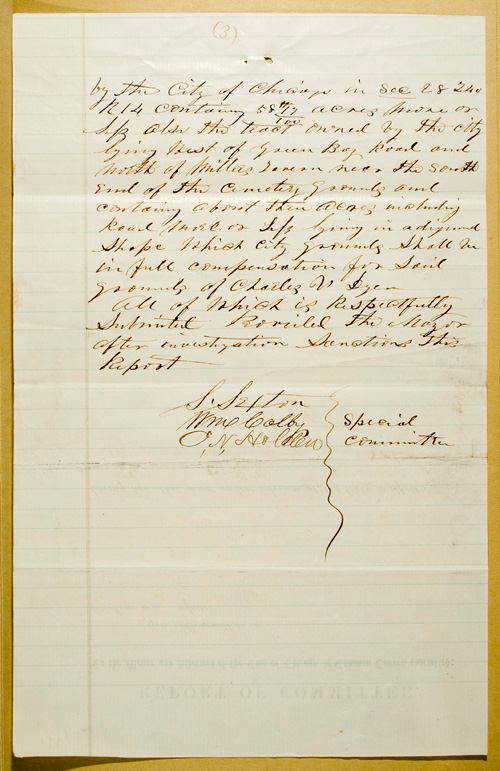 |
by the City of Chicago in Sec 28 T40 R14 containing 58 17/100 acres more or less. Also the tract owned by the City lying West of Green Bay Road and North of Millers Tavern Near the South end of the Cemetery Grounds and containing about three acres including ??? ??? or less lying in a diagonal shape which City grounds Shall be in full compensation for Said grounds of Charles V. Dyer.
All of which is Respectfully Submitted Provided the Mayor after investigation Sanctions this Report.
S. Sexton
Wm Colby
C.N. Holden
Special Committee
|
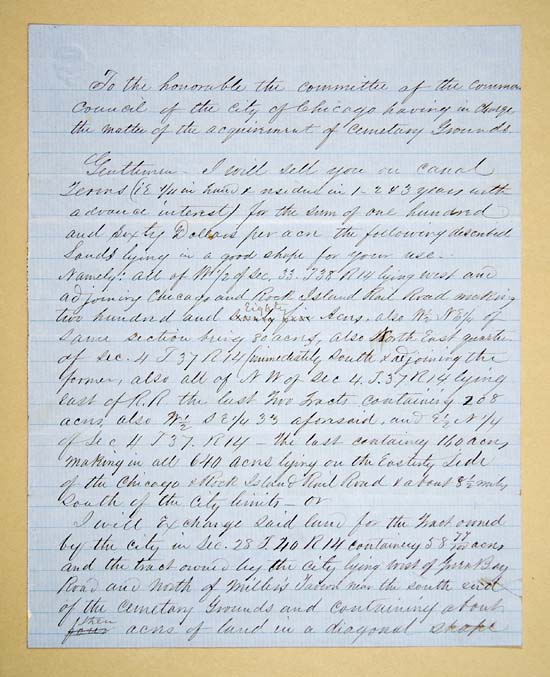
|
To the honorable the committee of the common council of the City of Chicago having in Charge the matter of the acquirement of Cemetery Grounds.
Gentlemen – I will sell you on Canal Terms (iE 1/4 in hand & residue in 1 – 2 & 3 years with advanced interest) for the sum of one hundred and Sixty Dollars per acre the following described Lands lying in a good shape for your use.
Namely: All of W1/2 of Sec.33. T38. R14 lying west and adjoining Chicago and Rock Island Rail Road making two hundred and Eighty Acres. Also W1/2 NE1/4 of same section being 80 acres. Also North East quarter of sec.4 T37 R14 (immediately south & rejoining the former, also all of NW of Sec4. T37 R14 lying east of R.R. the last Two Tracts containing 208 acres, also W1/2 SE1/4 33 aforesaid, and E1/2 N1/4 of Sec 4 T37 R14 – The last containing 160 acres making in al 640 acres lying on the Easterly Side of the Chicago & Rock Island Rail road & about 8 1/2 miles South of the City limits – or
I will exchange said land for the tract owned by the city in Sec.28 T40 R14 containing 58 77/100 acres and the tract owned by the city lying west of Green Bay Road and North of Miller’s Tavern near the south end of the Cemetery Grounds and Containing about three acres of land in a diagonal shape including the street –
I may add that there are about 6 miles of Good Cedar Post & Board fence on my Ground, the Roads are well made and there are three good Houses & a good Barn & five wells with Chain Pumps, and that these improvements have cost and are probably worth nine thousand dollars – and I may add the land is fine for your use. Very Respectfully
Your Obt Sevt
Chicago February 2 1857 Chas. V. Dyer
Recapitulation of Land offer
NW1/4 of 33.38.14 - Except 40 acres W. of R.R. 120 ac
SW 1/4 of “ “ 160 “
W1/2 SE1/4 “ “ 80 “
NW1/4 of 4. 37. 14 160 “
40 acres of 5. 37. 14 lying East of RR 40 “
E1/2 N1/4 4. 37. 14 80 “
640
**********************
(In a March 9, 1858, Common Council document, Charles Dyer withdrew his offer of grounds for a new cemetery.) |
 |
|
|

Courtesy of the Illinois Regional Archives Depository.
|
To the Honorable the Mayor and Aldermen in Common Council assembled.
The petition of the undersigned Citizens and owners of Lots in the Cemetery respectfully represent that the roads and Alleys and walks in the Cemetery are at this moment in a very careless not to say disgraceful condition, your petitioners therefore would respectfully beg your Hon. Body to pass an ordinance, providing becoming improvements, and the perfection of them being intrusted to some person properly qualified.
Chicago, September 18th A.D. 1858. |
Rev. T.M. Young By request of Evangelical Church
Wm. J. Reisburger
Pastor Joseph Hartmann
E.F. Dickinson
J.A. Wight
S.C. Bartlett
W.B. Hamilton
R.W. Patterson
D. Andrews
James Turner
Horace B. Pike
Otto Gelpeck
Wm. Allen Ingalls
S.W. Phillips
Tho. L. Forat
A.E. Small
W.S. Fecke
Thos. Bessenden
James Bessenden
T.W. Wadsworth
Geo. M. Weber
HC Waddell
Wm. G. Hibbard
F. Little
A.W. DeLong
C. Follansbee
F. Crumbaugh
O.R. Butler
J.M. Stein
S.C. Griggs
J.E. Aiken
E.R. Harmon
J.H. Gray
E.W. Hawley
Wm. W. Wheeler
Edward Fry
N.A. Coure ??
E.B. Myers
Albert C. Oertel
H. Wendt
E.P. Fenton
A.W. Rood
Qrm. R. Dawes
H.H. Towns
W.B. Keen
Geo. Manierre
John W. Macdonald
N.C. Angell
J.H. Phillips
B.F. Butler
L.L. Miller
William Ducat
Chas. Michael Calkins ??
Philip Lannon
Geo. R. Clark
J. W. Burt ??
Paul Cower ??
William J. Wallis
John H. Small
J.A. Smith
P. Palmer
A.S. Barnum
C.H. Arnot
Benjamin R. Watson
Altmore R. Wright
|
Anson Piper ??
D.H. Charlin ??
Edward Linkham
Andrew J. Breen ??
Henry L. Forrest
Philip R. Forrest
James Wadsworth
L.A. Willard
Andrew T. Sherman
???
J. Barker
C.A. Montague
W.E. Wheeler
S.R. Armstrong
Joseph Pierce
J.H.L. Manford
J. Banks
Wm. H. Pierce
S.D. Childs Jr.
GD Slade
W. Blackwell
J.C. Woolery ??
Arthur G. Burley
Nelson Luute
LG Luute
Z.P. Paddock
S.F. White
Chas. G. Smith
C.W. David
E.L. Jansen
Henry ???
Albert Keep
Jno H. Vincent
Robt. A. Murray no owner
L. P. Bradley
D. J. Haskell
J. Jenks ??
H.R. Caberey
Mark Kimball
C.E. Niswall ??
S. T. Wentworth
Wm. Francis
J.M. Hoadley
W.H. Johnson
A. Magnus
C.R. Larrabee
Robt. L. Worth
Thos. Juckley
J.P. Page
Geo. H. Gibson
S.C. Higginson
T.F. Phillips
Wess Van Inwagen ?? & Co.
E.M. Edwards
E.L. Knott
John G. Shortall
A.J. Higgins
W. Thomasson
W.Warner ??
Edward Wosmer??
Chas. Safsonman??
L.W. Fleetwood
R.S. Wilson
James Couch
M.D. Odgen
|
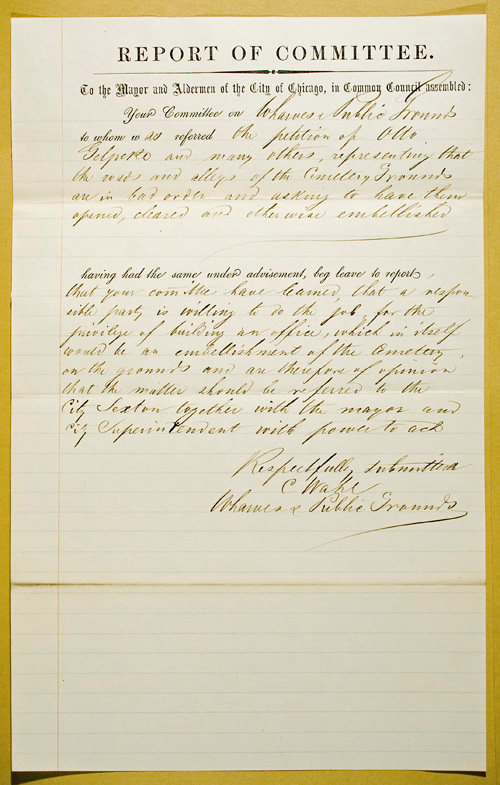
Courtesy of the Illinois Regional Archives Depository.
|
November 8, 1858
REPORT OF COMMITTEE.
To the Mayor and Aldermen of the City of Chicago, in Common council assembled:
Your Committee on Wharves & Public Grounds to whom was referred the petition of Otto Gelpeke and many others, representing that the roads and alleys of the Cemetery Grounds are in bad order and asking to have them opened, cleared and otherwise embellished
having had the same under advisement beg leave to report that your committee have learned that a responsible party is willing to do the job, for the privilege of building an office, which in itself would be an embellishment of the Cemetery, on the grounds and are therefore of opinion that the matter should be referred to the City Sexton together with the mayor and City Superintendent with power to act
Respectfully submitted
C Wahl
Wharves & Public Grounds
|
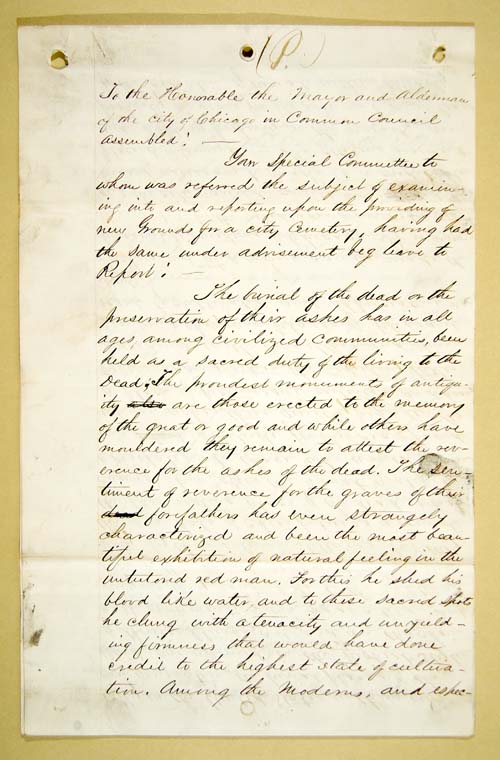
All documents on this page, courtesy of the Illinois Regional Archives Depository.
|
This ten-page document begins with a wistful account of a history of cemeteries, and continues with an explanation of how the location of the City Cemetery is unsanitary due to the close proximity of north-side residents. The paper continues with the argument that cemeteries should be run by private individuals or coporations and mentions that the City Cemetery grounds would be better suited as a public park. Lastly, an argument is made that the new Rosehill Cemetery grounds are more geographically suited for the burial of the dead, and it is suggested that Rosehill will also provide space to replace the Chicago cemetery's potter's field.
_____________________
To the Honorable the Mayor and Aldermen of the City of Chicago in Common Council assembled. –
Your Special Committee to whom was referred the subject of examining into and reporting upon the providing of new Grounds for a city Cemetery, having had the same under advisement beg leave to Report:
The burial of the dead or the preservation of their ashes has in all ages among civilized communities, been held as a sacred duty of the living to the Dead. The proudest monuments of antiquity are those erected to the memory of the great or good and while others have mouldered they remain to attest the reverence for the ashes of the dead. The sentiment of reverence for the graves of their forefathers has even strangely characterized and been the most beautiful exhibition of natural feeling in the untutored red man. For this he shed his blood like water and to these sacred spots he clung with a tenacity and unyielding firmness that would have done credit to the highest state of cultivation. Among the moderns, and especially |
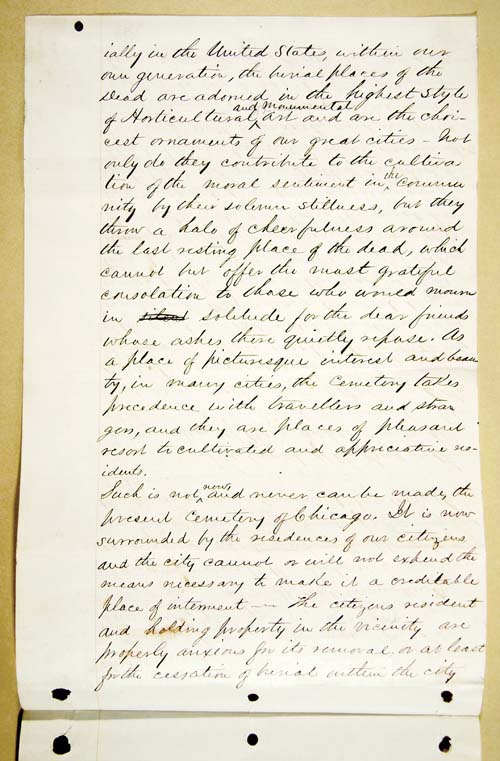 |
especially in the United States, within our own generation, the burial places of the Dead are adorned in the highest style of Horticultural and Monumental art and are the choicest ornaments of our great cities – not only do they contribute to the cultivation of the moral sentiment in the community by their solemn stillness, but they throw a halo of cheerfulness around the last resting place of the dead, which cannot but offer the most grateful consolation to those who would mourn in solitude for the dear friends whose ashes there quietly repose. As a place of picturesque interest and beauty, in many cities, the Cemetery takes precedence with travelers and strangers, and they are places of pleasant resort to cultivated and appreciative residents.
Such is not now, and never can be made, the present Cemetery of Chicago. It is now surrounded by the residences of our citizens and the city cannot or will not expend the means necessary to make it a creditable place of interment. The citizens resident and holding property in the vicinity are properly anxious for its removal, or at least for the cessation of burial within the city |
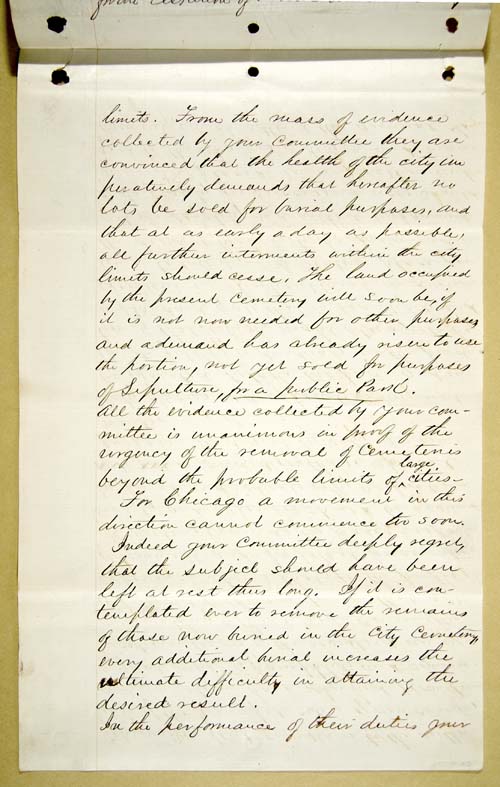 |
limits. From the mass of evidence collected by your Committee they are convinced that the health of the city imperatively demands that hereafter no lots be sold for burial purposes, and that at as early a day as possible, all further interments within the city limits should cease. The land occupied by the present cemetery will soon be, if it is not now needed for other purposes, and a demand has already risen to use the portion, not yet sold for purposes of Sepulture, for a public Park. All the evidence collected by your committee is unanimous in proof of the urgency of the removal of Cemeteries beyond the probably limits of large cities –
For Chicago a movement in this direction cannot commence too soon. Indeed your Committee deeply regret, that the subject should have been left at rest this long. If it is contemplated ever to remove the remains of those now buried in the City Cemetery, every additional burial increases the ultimate difficulty in attaining the desired result.
In the performance of their duties your |
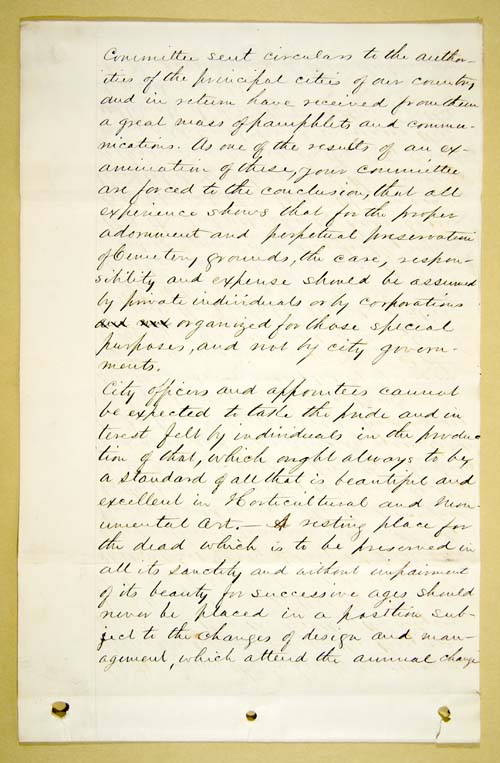 |
Committee sent circulars to the authorities of the principal cities of our country and in return have received from them a great mass of pamphlets and communications. As one of the results of an examination of these, your Committee are forced to the conclusion, that all experience shows that for the proper adornment and perpetual preservation of Cemetery Grounds, the care, responsibility and expense should be assumed by private individuals or by corporations organized for those special purposes, and not by city governments.
City officers and appointees cannot be expected to take the pride and interest felt by individuals in the production of that, which ought always to be, a standard of all that is beautiful and excellent in Horticultural and Monumental Art. – A resting place for the dead which is to be preserved in all its sanctity and without impairment of its beauty for successive ages should never be placed in a position subject to the changes of design and management, which attend the annual change |
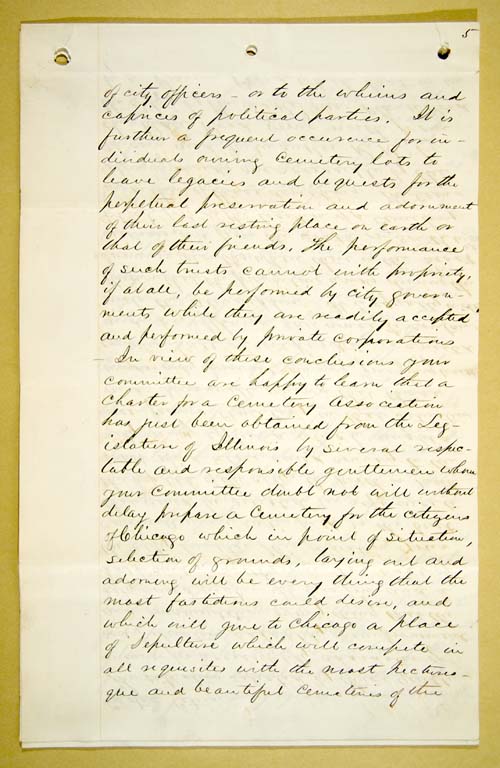 |
of city officers – or to the whims and caprices of political parties. It is further a frequent occurrence for individuals owning Cemetery lots to leave legacies and bequests for the perpetual preservation and adornment of their last resting place on earth or that of their friends. The performance of such trusts cannot with propriety, if at all, be performed by city governments while they are readily accepted and performed by private corporations.
– In view of these conclusions your Committee are happy to learn that a Charter for a Cemetery Association has just been obtained from the Legislature of Illinois by several respectable and responsible gentlemen whom your Committee doubt not will without delay prepare a Cemetery for the citizens of Chicago which in point of situation, selection of grounds, laying out and adorning will be every thing that the most fastidious could desire, and which will give to Chicago a place of Sepulture which will compete in all requisites with the most picturesque and beautiful cemeteries of the |
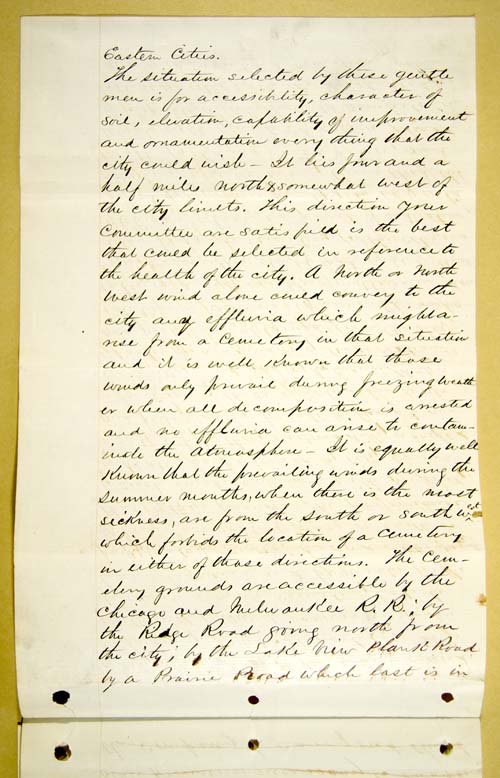 |
Eastern cities.
The situation selected by these gentlemen is for accessibility, character of soil, elevation, capability of improvement and ornamentation every thing that the city could wish. – It lies four and a half miles north & somewhat west of the city limits. This direction your Committee are satisfied is the best that could be selected in reference to the health of the city. A North or North West wind alone could convey to the city any effluvia which might arise from a Cemetery in that situation and it is well known that those winds only prevail during freezing weather when all decomposition is arrested and no effluvia can arise to contaminate the atmosphere. – It is equally well known that the prevailing winds during the Summer months, when there is the most sickness, are from the South or South West which forbids the location of a cemetery in either of those directions. The Cemetery grounds are accessible by the Chicago and Milwaukee R.R. by the Ridge Road going North from the city, by the Lake View Plank road by a Prairie Road which last is in |
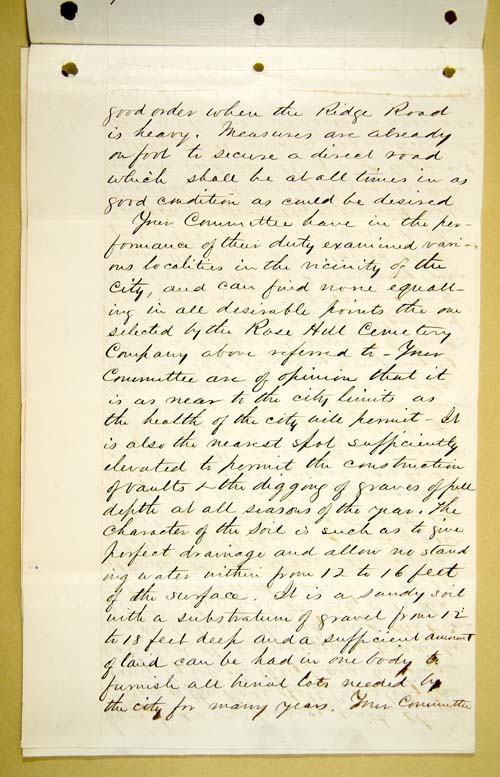 |
good order when the ridge Road is heavy. Measures are already on foot to secure a direct road which shall be at all times in as good condition as could be desired.
Your Committee have in the performance of their duty examined various localities in the vicinity of the City, and can find none equalling in all desirable points the one selected by the Rose Hill Cemetery Company above referred to – Your Committee are of opinion that it is as near to the city limits as the health of the city will permit. – It is also the nearest spot sufficiently elevated to permit the construction of vaults & the digging of graves of full depth at all seasons of the year. The character of the soil is such as to give perfect drainage and allow no standing water within from 12 to 16 feet of the surface. It is a sandy soil with a substratum of gravel from 12 to 18 feet deep and a sufficient amount of land can be had in one body to furnish all burial lots needed by the city for many years. Your Committee |
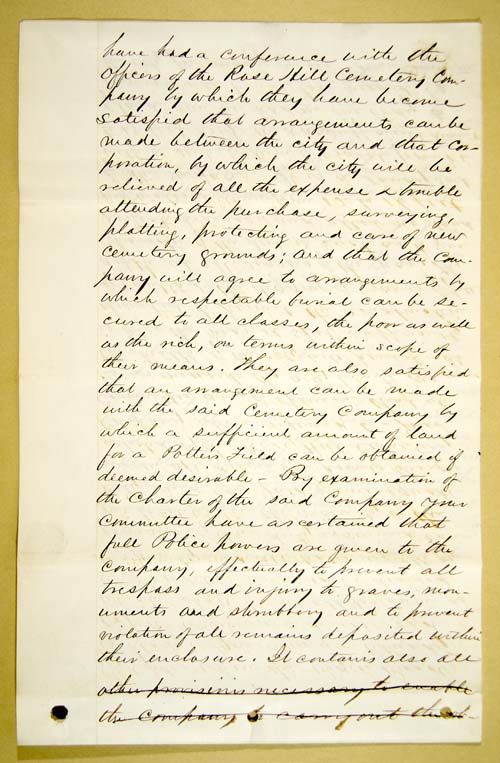 |
have had a conference with the Officers of the Rose Hill Cemetery Company by which they have become satisfied that arrangements can be made between the city and that Corporation, by which the city will be relieved of all the expense & trouble attending the purchase, surveying, platting, protecting and care of new cemetery grounds; and that the Company will agree to arrangements by which respectable burial can be secured to all classes, the poor as well as the rich, on terms within scope of their means. They are also satisfied that an arrangement can be made with the said Cemetery Company by which a sufficient amount of land for a Potter’s Field can be obtained if deemed desirable. – By examination of the Charter of the said Company your Committee have ascertained that full Police powers are given to the Company, effectually to prevent all trespass and injury to graves, monuments and shrubbery and to prevent violation of all remains deposited within their enclosure. It contains also all |
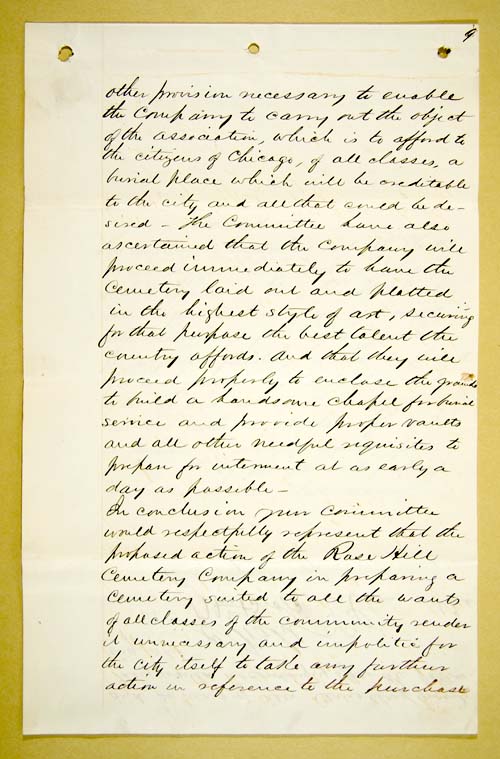 |
other provision necessary to enable the Company to carry out the object of the Association, which is to afford to the citizens of Chicago, of all classes, a burial place which will be creditable to the city and all that could be desired. – The Committee have also ascertained that the Company will proceed immediately to have the Cemetery laid out and platted in the highest style of art, securing for that purpose the best talent the Country affords. And that they will proceed properly to enclose the grounds to build a handsome Chapel for burial service and provide proper vaults and all other needful requisites to prepare for interment at as early a day as possible. –
In conclusion your Committee would respectfully represent that the proposed action of the Rose Hill Cemetery Company in preparing a Cemetery suited to all the wants of all classes of the community render it unnecessary and impolitic for the City itself to take any further action in reference to the purchase
|
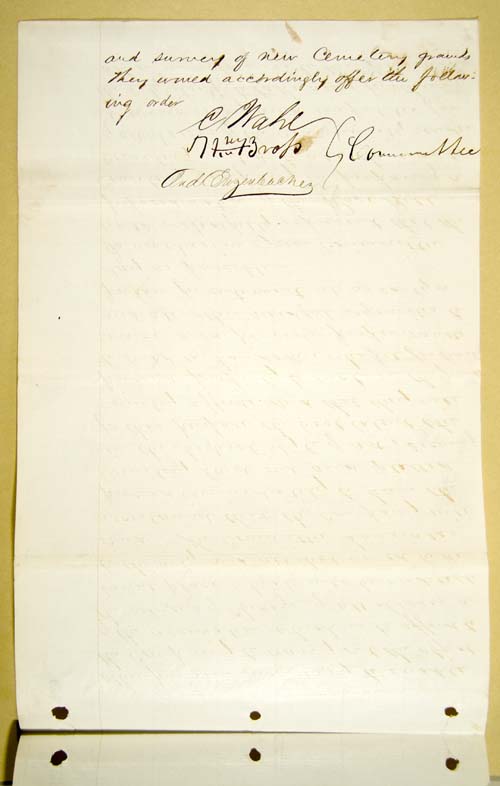 |
and survey of new Cemetery grounds. They would accordingly offer the following order
C. Wahl
Wm Bross
Andrew Ensenbacher
|
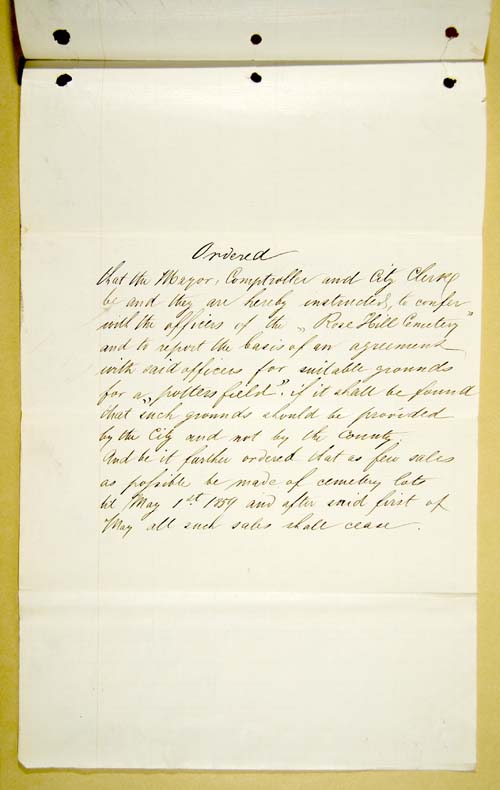 |
Ordered
That the Mayor, Comptroller and city Clerk be and they are hereby instructed, to confer with the officers of the “Rose Hill Cemetery” and to report the basis of an agreement with said officers for a suitable grounds for a “potters field”, if it shall be found that such grounds should be provided by the City and not by the County.
And be it further ordered that as few sales as possible be made of cemetery lots til May 1st 1859 and after said first of May all such sales shall cease. |
Simultaneous to the medical discussions regarding the deleterious effects of urban cemeteries on the health of an urban population, the rural cemetery movement was underway. (See the Contributing Factors in Moving the Cemetery section.)
The newspaper snippet to the right is part of the 1859 Proposal & Ordinance to Stop Burials. The same-titled Tab, above, contains the original handwritten document. This article also mentions the conversations the city was having with the Rosehill Cemetery Company regarding Rosehill adapting a section of their burial grounds as a "potters field." This discussion continues in the next section: 1860-1864.
The article, below, was published two days before Rosehill Cemetery's inauguration. The opening day ceremonies and picnic were enjoyed by 8000 Chicagoans.
Click here for more information about Rosehill Cemetery.
Chicago Press and Tribune, July 27, 1859
 |
Chicago Press and Tribune, February 16, 1859
 |
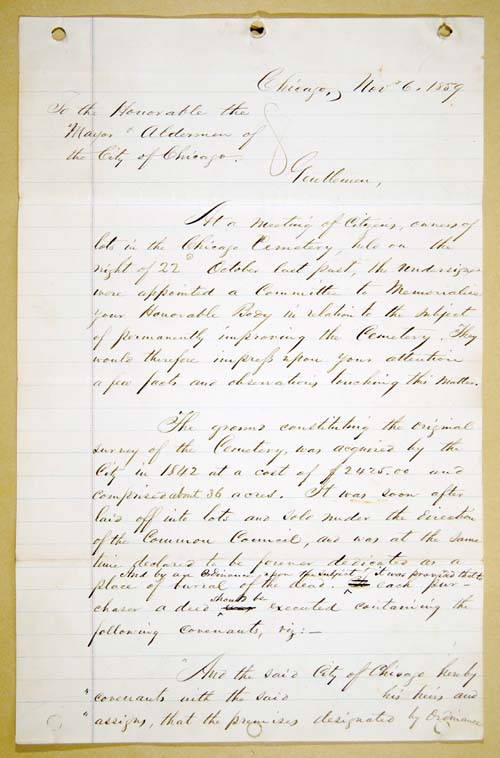
All documents on this page, courtesy of the Illinois Regional Archives Depository.
|
This document, which begins with a brief history of the City Cemetery, continues with an accusation that the City has been neglecting the grounds while individuals have spent large sums of money embellishing and otherwise caring for their family plots. Written by five citizens who collectively became known as the "memorialists", the plea ends with some harsh words about the state of the burial grounds and a call for a Common Council committee to oversee the improvement of the cemetery.
________________
Chicago, Nov 6, 1859
To the Honorable the Mayor & Aldermen of the City of Chicago.
Gentlemen,
At a meeting of Citizens, owners of lots in the Chicago Cemetery, held on the night of 22nd October last past, the undersigned were appointed, a Committee to Memorialise your Honorable Body in relation to the subject of permanently improving the Cemetery. They would therefore impress upon your attention a few facts and observations touching the matter.
The ground constituting the original survey of the Cemetery, was acquired by the City in 1842 at a cost of $2425.00 and comprised about 35 acres. It was soon after laid off into lots and sold under the Direction of the Common Council, and was at the same time declared to be forever dedicated as a place of burial of the dead. And by an Ordinance upon the subject of it was provided that to each purchaser a deed should be executed containing the following covenants, viz: -
“And the said City of Chicago hereby covenants with said__________his heirs and assigns, that the premises designated by Ordinance |
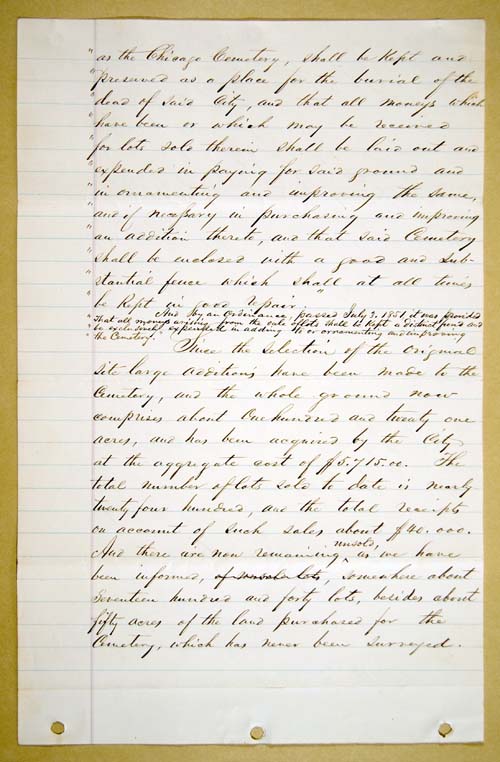 |
as the Chicago Cemetery, shall be Kept and preserved as a place for the burial of the dead of said City, and that all moneys which have been or which may be reserved for lots sold therein shall be laid out and expended in paying for said ground and in ornamenting and improving the same, and if necessary in purchasing and improving an addition thereto, and that said Cemetery shall be enclosed with a good and substantial fence which shall at all times be kept in good repair.”
“And by an Ordinance, passed July 3, 1851, it was provided That all moneys arising from the sale of lots shall be Kept a distinct fund and be exclusively expended in adding to or ornamenting and improving the Cemetery.”
Since the selection of the original site large additions have been made to the Cemetery, and the whole ground now comprises about One hundred and twenty one acres, and has been acquired by the City at the aggregate cost of $5,715.00. The total number of lots sold to date is nearly twenty four hundred, and the total receipts on account of such sales about $40,000. And there are now remaining unsold, as we have been informed, somewhere about seventeen hundred and forty lots, besides about fifty acres of the land purchased for the Cemetery, which has never been surveyed. |
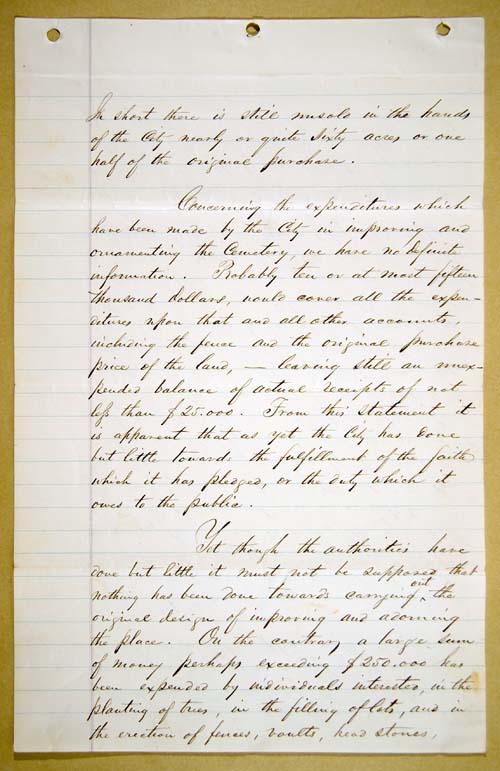 |
In short there is still unsold in the hands of the City nearly or quite Sixty acres or one half of the original purchase.
Concerning the expenditures which have been made by the City in improving and ornamenting the Cemetery, we have no Definite information. Probably ten or at most fifteen thousand dollars, would cover all the expenditures upon that and all other accounts including the fence and the original purchase price of the land, - leaving still an unexpended balance of actual receipts of not less than $25,000. From this statement it is apparent that as yet the City has done but little towards the fulfillment of the faith which it has pledged, or the duty which it owes to the public.
Yet though the authorities have done but little it must not be supposed that nothing has been done towards carrying out the original design of improving and adorning the place. On the contrary a large sum of money perhaps exceeding $250,000 has been expended by individuals interested, in the planting of trees, in the filling of lots, and in the erection of fences, vaults, head stones,
|
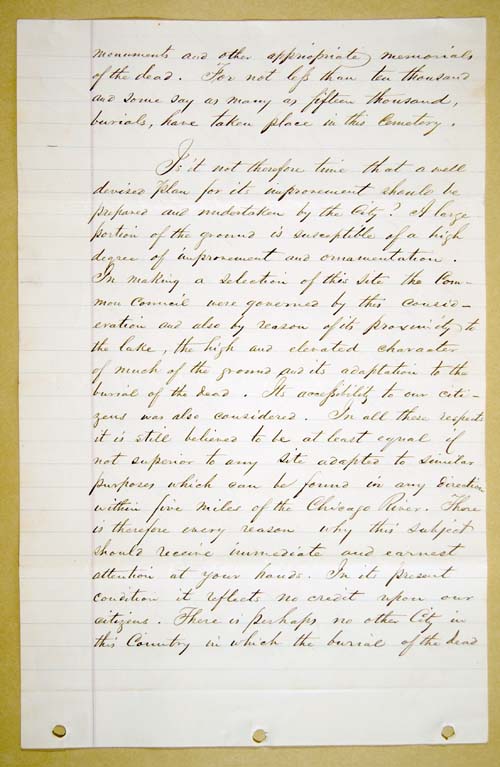 |
monuments and other appropriate memorials of the dead. For not less than ten thousand and some say as many as fifteen thousand, burials, have taken place in the Cemetery.
Is it not therefore time that a well devised plan for its improvement should be prepared and undertaken by the City? A large portion of the ground is susceptible of a high degree of improvement and ornamentation. In making a selection of this site the Common Council were governed by this consideration and also by reason of its proximity to the lake, the high and elevated character of much of the ground and its adaptation to the burial of the dead. Its accessibility to our citizens was also considered. In all these respects it is still believed to be at least equal if not superior to any site adapted to similar purposes which can be found in any Direction within five miles of the Chicago River. There is therefore every reason why this subject should receive immediate and earnest attention at your hands. In its present condition it reflects no credit upon our citizens. There is perhaps no other City in this Country in which the burial of the dead |
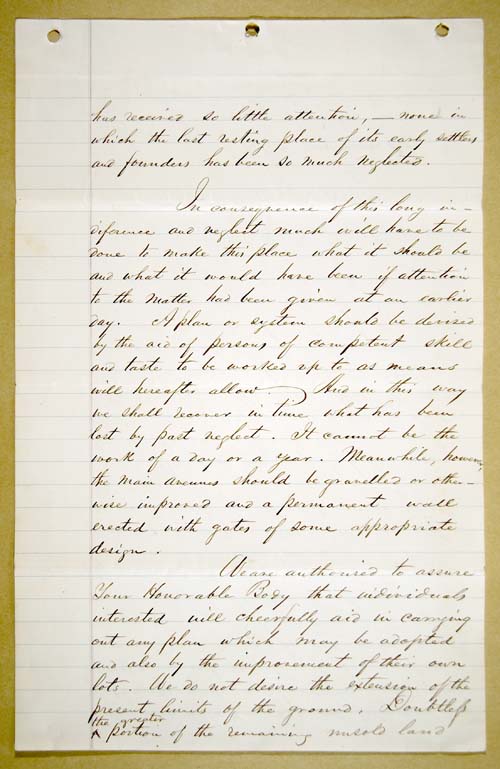
|
has received so little attention, - none in which the last resting place of its early settlers and founders has been so much neglected.
In consequence of this long indifference and neglect much will have to be done to make this place what it should be and what it would have been if attention to the matter had been given at an earlier day. A plan or system should be devised by the aid of persons of competent skill and taste to be worked up to as means will hereafter allow. And in this way we shall recover in time what has been lost by past neglect. It cannot be the work of a day or a year. Meanwhile, however, the main avenues should be graveled or otherwise improved and a permanent wall erected with gates of some appropriate design.
We are authorised to assure your Honorable Body that individuals interested will cheerfully aid in carrying out any plan which may be adopted and also by the improvement of their own lots. We do not desire the extension of the present limits of the ground. Doubtless the greater portion of the remaining unsold land |
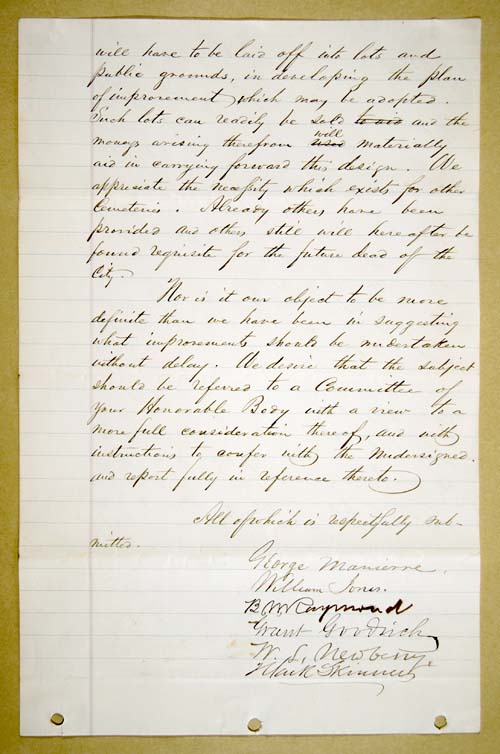 |
will have to be laid off into lots and public grounds, in developing the plan of improvement which may be adopted. Such lots can readily be sold and the moneys arising therefrom will materially aid in carrying forward this design. We appreciate the necessity which exists for other Cemeteries. Already others have been provided and others still will hereafter be found requisite for the future dead of the City.
Nor is it our object to be more definite than we have been in suggesting what improvements should be undertaken without delay. We desire that the subject should be referred to a Committee of Your Honorable Body with a view to a more full consideration thereof, and with instructions to confer with the undersigned and report fully in reference thereto.
All of which is respectfully submitted.
George Manierre
William Jones
B.W. Raymond
Grant Goodrich
W.L. Newberry
Mark Skinner |
|